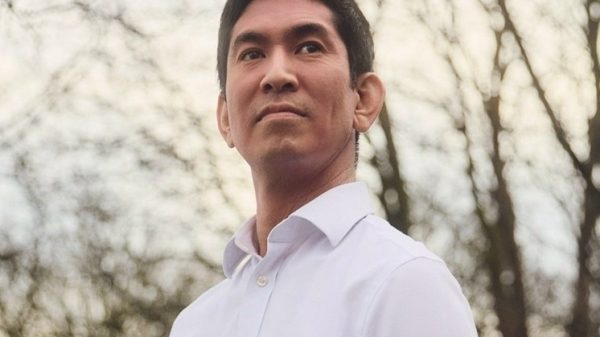“Strategic narcissism” is the term of reference for HR McMaster’s latest book. Coined by the late Hans Morgenthau, it refers to a tendency “to view the world only in relation to the US”. Instead, McMaster argues that America should embrace “strategic empathy” as its doctrine for international relations. But what sounds good as theory is not always easily deliverable.
HR McMaster on serving Trump: ‘If you’re not on the pitch, you’re going to get your ass kicked’
Read more
Donald Trump’s second national security adviser, a retired three-star general, positions himself as a historian and thinker who would rely upon diplomacy, democracy, alliances and realism to implement policy objectives. He is not an isolationist, a subscriber to the theory the US is to blame for the world’s ills, or a doctrinaire realist.
Driving his point home, he castigates Charles Koch, on the right, and George Soros, on the left, and their jointly funded Quincy Institute for Responsible Statecraft. As McMaster sees it, they wrongly advocate “American retrenchment”. McMaster also criticizes those within the Trump administration who argue against a large US footprint in the Middle East and advocate against “endless wars”.
In McMaster’s view, the US cannot easily walk away. As if to prove his point, reports abound of US troops and tanks redeploying to eastern Syria after clashes with Russian troops. Other events, however, have caught up with McMaster – and passed him by.
It is not clear the US public is in sync with the more muscular and constant use of force which McMaster supports
The normalization of relations between Israel, Bahrain and the United Arab Emirates forms a western-allied bulwark against Iran, without an increased US military presence. The president and his son-in-law got this one right. Practically speaking, US allies will be doing more heavy lifting in the not-so-cold war against Tehran.
Interestingly, Battlegrounds is more critical of George W Bush for postwar failures in Iraq than for invading in the first place. McMaster blames unfounded optimism for the chaos that followed an unnecessary war. “The US-led coalition was too slow to adopt to the evolution of the enemy and its strategy,” he writes. “There was insufficient civilian capacity to stabilize the country.”
But McMaster fails to lay out what could have been done differently – not attacking Iraq would appear the simpler path. Beyond that, it is not clear the US public is in sync with the more muscular and constant use of force that McMaster supports.
Granular examination of election returns from 2016 shows body counts mattered. There was a notable correlation between battlefield casualties in Iraq and Afghanistan and support for Trump.
Those parts of the US that felt the carnage more as reality than abstract swung Republican. According to Douglas L Kriner of Boston University and Francis X Shen of the University of Minnesota, “Wisconsin, Pennsylvania and Michigan could very well have been winners for [Hillary] Clinton if their war casualties were lower.” Strategic empathy ought to begin at home.
Those who were hoping Battlegrounds would be a vehicle for settling scores with the president will be disappointed. McMaster is not John Bolton. Rather, he endeavors to call balls and strikes in assessing foreign policy. He takes the Obama administration to task for the Iran nuclear deal. To McMaster, the US gave away too much and received too little.
He characterizes Iran as ideologically hostile to the US and Israel, and does not foresee any thaw in the near future. Instead, he argues for vigilance. That said, he did advise Trump against abandoning the deal.
The president did not take heed. Rather, the administration recently demanded the imposition of snap-back sanctions, a move opposed by allies in Europe. Trump and the secretary of state, Mike Pompeo, are faced with the test of whether they can deploy the international banking and monetary systems to bend the rest of the world to their will and bring Iran to its knees.
Trump, McMaster reminds the reader, described Kim Jong-un as ‘honorable’ and a person who ‘loves his people’
McMaster strikes a similar tone on North Korea before Trump: “Washington remained weak in its response by continuing to engage the regime for potential talks, under the misguided assumption that reconciliatory diplomacy could generate a fundamental shift in Pyongyang’s policy.”
Yet McMaster laments Trump downplaying human rights abuses, including the death of Otto Warmbier. Trump, McMaster reminds the reader, described Kim Jong-un as “honorable” and a person who “loves his people” – despite the brutal maltreatment meted out to the student from Ohio.
Not surprisingly, the author has a dim view of both Russia and China. With regard to Russia, he recalls how Barack Obama mocked Mitt Romney for labeling it the No 1 geopolitical threat, and upbraids Trump’s 2016 campaign for enlisting its assistance. As for China, McMaster credits the Trump administration for recognizing the danger posed by a resurgent Middle Kingdom, in contrast to its predecessors.
McMaster’s embrace of “strategic empathy” may well be a highbrow synonym for engaged prudence at home and abroad. Although he is sympathetic to the president’s demands that US allies pick up a larger share of defense costs, he places a premium on alliances. He sees them a means for projecting power and optimizing outcomes.
Rage review: Will Bob Woodward’s tapes bring down Donald Trump?
Read more
Likewise, McMaster takes climate change as reality, and accuses “climate deniers and skeptics” of “disregarding compelling evidence”. He makes clear that he opposed exiting the Paris accords.
At the same time, McMaster views the Green New Deal as an “unrealistic proposal” and a “non-solution”. He accuses both sides of strategic narcissism, and instead calls for a “comprehensive strategy” that recognizes that nations will not “suppress their security and economic interests” simply to join an international agreement”. Not surprisingly, McMaster advocates continued transnational cooperation – with the US taking the lead.
As the US hurtles toward election day, hyper-partisanship and metaphors of Armageddon fill our pages and screens. Tuesday’s debate further raised the temperature. Battlegrounds may struggle to find a ready audience. Its time may already be gone.





















































Свежие комментарии